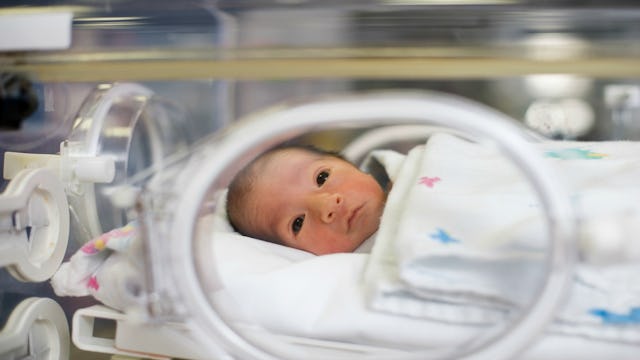I Didn’t Know Fear Until We Almost Lost A Child

I followed Norah down the hospital hallway. The nurses were moving at a quick trot, and I had to sprint to keep up with them. They placed Norah in a large glass box with four round doors on the sides. The next few hours were a blur of nurses and doctors surrounding my daughter, discussions with one medical professional and then another, and another. The biggest question I had was, “Is she going to be okay?” followed by, “Why did this happen?”
The scariest part about it wasn’t the doctors, or the machines, or the rushed direct language of the medical staff. What was the most unsettling was that Norah, our newborn daughter, wasn’t crying. It was the silence that really put a pit in my gut.
She was rushed from one room to another, and eventually placed in an ambulance and transported to another hospital, and all the while, I hoped for answers, but was told that there was no time. It wasn’t until late that afternoon, hours after the delivery, once Norah was settled, and I was in a NICU 20 miles south of the hospital where my wife sat in bed recovering from a C-section, that a doctor told me that Norah had hypertension in the artery between her heart and her lungs. This caused her lungs not to receive enough blood in-utero so they were under-developed. “She doesn’t have any pulmonary surfactant,” he said.
I asked him what that was and he said, “It’s in your lungs. It’s what keeps them from collapsing every time you exhale.”
He then talked about treatments. He mentioned steroids and lung injections, and I looked at this small little girl who would fit nicely between my elbow and hand, with tubes and monitors all around her, and wondered what was next. I wondered how she would survive what sounded like very adult procedures.
That first night with her in the NICU, time slowed down. Mel couldn’t leave her hospital, and Norah couldn’t leave the NICU. I sat alone with my new daughter most of the night. It was in that quiet space that I really began to understand fear. It was then that I had the time to sit and reflect on the fact that I might lose our daughter before I had a chance to hold her. Before I had a chance to let her climb on me. Before I got to see her smile, or walk and talk and laugh. I was 29. I’d lost my father by then. I’d lost my grandmother, the woman who raised me for most of my teen years.
I’d experienced loss. But I’d never felt fear. Not like that. Not the deep numbing rock of dread that sets deep inside your body the moment losing a child become very real.
The next several days were a blur of long prayers, little sleep, and traveling between hospitals. I usually started the day visiting Norah. I’d sit with her, get a report from the doctors. But I couldn’t touch her. She was sedated and lifeless. All I could really do was speak to her. I told her that I loved her, and that it was going to be okay. I tried to speak with confidence even though I’d never felt less confident.
Around lunch I’d visit Mel. The doctors told her that she couldn’t leave the hospital to visit Norah until she could walk unassisted. Despite her C-section, she was up and walking the next day. I’ve never seen her so determined. I’ve also never seen her appear so alone. She looked trapped. She looked like a mother separated from her child who had nothing to do but sit and dread what might happen. She’d never seen Norah. She’d never held her, or kissed her. And there was a real fear that she might never have the opportunity to.
At the time, I thought a lot about my daughter. I worried about her and if she would make it. I also felt a lot of dread. But what I don’t think I fully understood until later was how much pain my wife felt being stuck in that hospital away from her daughter. She was going through the same torment as me, but she was stuck in bed, feeling like a prisoner, separated from the child she just carried in her body for 9 months. I was scared, but what I was feeling couldn’t have been nearly as difficult as what Mel was going though.
In the evening, I’d travel back to see Norah, and stay with her until late in the night. One night, as I drove home from the hospital around midnight, the alternator went out on my truck and I barely made it home.
These were the hardest few days of my life.
Norah was in the NICU for two weeks. She went through treatment after treatment. It was over a week before we could hold her, and each time we did, I think there was a part of me that wondered if it would be the last time. It wasn’t until a day or two before her release that doctors made a confident diagnosis that she would make a full recovery. We took her home attached to large green oxygen tanks, much larger than she was, with small clear tubes.
That first day home, Norah cried most of the night. And although I was exhausted the next day, I’d never been so grateful to hear her a child cry.